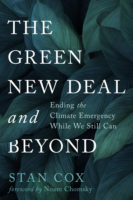 Ed. note: Excerpted from The Green New Deal and Beyond: Ending the Climate Emergency While We Still Can by Stan Cox with permission of the publisher. Published by City Lights.
Ed. note: Excerpted from The Green New Deal and Beyond: Ending the Climate Emergency While We Still Can by Stan Cox with permission of the publisher. Published by City Lights.
If fossil fuels are rapidly eliminated during the transition to non-fossil energy, the pool of energy available to society will shrink. How much it shrinks will depend on how fast the new energy capacity and a new electric grid can be developed. And if the transition succeeds, the handy liquid fuels that for a century have powered road travel, farming, freight hauling, and air travel will be flushed out of society forever. Operating buildings, transportation, and industry mostly on electricity will be much more complicated. But adapting to a leaner energy diet does not have to be a grim ordeal; in fact, it will provide opportunities to scale back the environmental and societal damage that potent, portable en- ergy sources, especially liquid fuels, have empowered us to inflict.
The United States can reduce its energy consumption by first starving the harmful and wasteful parts of the economy that should have been curtailed already on other grounds. The cutting can start in the U.S. military, which produces more greenhouse emissions than most entire countries do—a huge quantity of it from jet fuel. The cuts should extend to demilitarizing law enforcement and abolishing mass incarceration. We can slash the energy allowance of the nation’s most affluent people, who account for a disproportionate share of energy consumption and emissions; by one estimate, households having more than $1 million in investment assets are contaminating the Earth’s atmosphere with ten times more greenhouse emissions than the average household. Cutting harm and waste can get us some distance toward eliminating emissions, but it won’t be enough. A lower-energy economy will need to produce fewer goods and services overall—still enough necessary products to go around, just less production of goods that contribute little more than profits to the seller and waste to the landfill.
Living with lower energy consumption doesn’t have to mean a life of deprivation and hardship. On this point, some international comparisons may be useful. Let’s say we cut this country’s total energy consumption in half. Today, five countries consume approximately half as much energy per capita as the United States does: Denmark, Japan, Slovakia, Slovenia, and Switzerland. All are well-functioning societies with good quality of life. And, according to the United Nations, they all rank higher on the Human Development Index scale than the United States does.
Looking lower down the energy scale, where countries consume about one-fourth as much energy per capita as we do, we find Argentina, Croatia, Cyprus, and Romania. These countries rank slightly lower in Human Development Index than the United States, but all are within the U.N.’s “High” or “Very High” categories. Some of these countries would clearly be better places to live than others, but the larger point is that consuming 75 percent less energy per person than the United States doesn’t require a society to adopt a monastic lifestyle.
Shrinking energy use will shrink production of goods and services, and therefore wealth production. A smaller economy would not necessarily be a bad thing. Decades of research have shown that once GDP per person is sufficient to ensure security in food, housing, medical care, education, and other necessities, further increases in GDP do not bring an enduring improvement in people’s life satisfaction. Accordingly, bringing America’s bloated GDP down to size and curing the economy’s cruelly high level of inequality will improve the quality of life for millions of Americans and make us a better society. To reach that goal, we have a long way to go. Jason Hickel has formulated a Sustainable Development Index that incorporates elements of the Human Development Index but penalizes high per-capita material consumption. When Hickel ranked most of the world’s nations by their Sustainable Development Index, the United States came in at fifth from the bottom, at number 159.
When it’s pumping up elite lifestyles, renewable energy is not green energy. Hickel makes a convincing case that “reducing inequality needs to be at the very heart of climate policy.” A less unequal society will also be a happier society overall. The purpose of consumption is supposedly to satisfy needs and make us happy, but our brains evaluate the satisfaction we derive from our own consumption by comparing it with the consumption of those around us. An increase in the income or wealth of our friends and neighbors makes us feel less affluent ourselves; on the other hand, seeing those around us build better social relationships makes us more, not less, satisfied with our own personal networks.
Don Fitz has painted an encouraging picture of a society living with less energy and less production. A society that has stopped investing labor and energy in mass incarceration and militarism, he says, will be more humane. Walkable, livable communities will be free of private-vehicle traffic; air, noise, and light pollution; and other dangers. A transformed food system will ensure better nutrition for all. Free neighborhood public and community clinics will provide preventive medical care, reducing by several sizes the economic and environmental footprint of today’s profit-driven medical industries. “The concept of changing consciousness is empty if we are forced to participate in harmful production with no power to curb it,” Fitz writes. “Every group of working people needs to ask if what they are producing is good or harmful. Should it be increased, changed, reduced or abolished? If they decide that what they produce needs to be reduced or halted, how should the changes be made and what alternative jobs should they have?”






